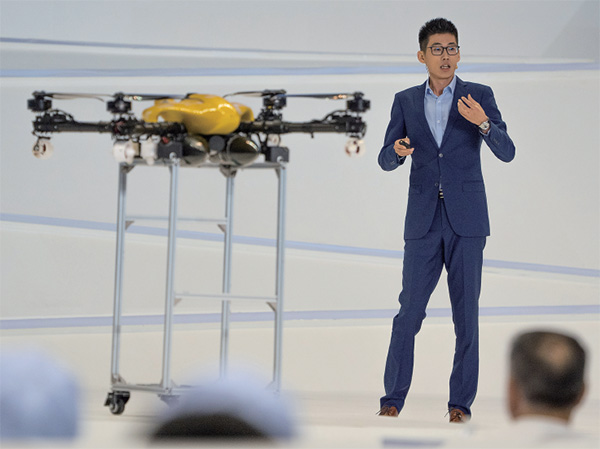
Competition showcases groundbreaking projects from global students, spotlighting youth creativity and technological prowess across diverse fields.
The grand final of the 2024 China International College Students' Innovation Competition concluded on Oct 15 at Shanghai Jiao Tong University (SJTU), drawing young innovators from around the world.
Teams of aspiring students from some of the world's top universities showcased their projects that address challenging issues in various fields, including engineering, medicine, and artificial intelligence (AI).
A team from SJTU won the championship for developing a hybrid aerial-underwater vehicle capable of operating in the air, on the water's surface, and underwater.
"Our product is a new type of multifunctional equipment that can be applied to both aerial detection and underwater exploration. We initially aimed to tackle the challenges that oceanographers face in marine observation and data collection," said Lyu Chenxin, the team's representative and a doctoral student at SJTU's School of Oceanography.
The team has explored a diverse range of applications for their product, including marine engineering, resource exploration, search and rescue, and environmental monitoring.
"This competition gave us the opportunity to showcase the incremental progress we've achieved over years of effort," Lyu said. "We are also honored to spread our project globally, letting the world know what Chinese youth are doing and where our strength lies."
Another team from SJTU has also achieved notable results in the application of their lightweight and stainless magnesium materials.
Their magnesium alloy materials have been used in Lenovo laptops, BYD electric vehicles, as well as components and devices in the aerospace and optical telecommunication industries.
"Looking back at the course of industrial development, we found that the role of common metal materials has constantly evolved, whether it is steel or aluminum. Magnesium and its alloys offer advantages over other conventional metals such as low density and good ductility," said Gu Lidong, the team representative and a doctoral candidate in materials science at SJTU.
"Based on our studies, we have published more than 30 papers in key research journals and obtained over 20 certified patents. In the future, we will continue to innovate and promote China's self-developed magnesium materials to the world."

Apart from outstanding graduate students, undergraduate teams also impressed judges and audiences with their innovative projects.
A team from Zhejiang University developed a new type of hemostatic gel intended to replace traditional sutures in surgery, addressing the issue of biogels that fail to dissolve in the human body.
"Nowadays, it's estimated that one person dies from blood vessel injuries every eight seconds. Surgeons urgently need high-performance hemostatic gels that ensure patient safety during and after vessel suturing," said Huang Chaoyu, a team member and student at the School of Materials Science and Engineering.
This year's competition introduced an "AI+" category, spotlighting AI-empowered innovations that integrate multiple fields and disciplines.
A group of college students from the Beijing University of Posts and Telecommunications developed a teaching platform equipped with AI tools to assist teachers with answering questions, checking homework, and more.
Leveraging their expertise in AI, education, computer engineering, and communication technology, the team enables instant, heuristic, and personalized tutoring for students, as well as online educational support for teachers.
In addition to these impressive tech-driven projects, students competing in the new liberal arts category also demonstrated strengths in management and communication.
A team of 14 undergraduate students from Beijing Sport University set up a company that organizes international fitness and bodybuilding competitions and promotes its own sports equipment brand, "Loong Fitness".
"We focus on research in physical health promotion, aiming to raise people's awareness of fitness and encourage greater participation in sports by expanding the influence of bodybuilding competitions in China," said Luo Xiao, a team member.
Co-hosted by 12 departments, including the Ministry of Education and the Shanghai Municipal People's Government, the competition has attracted a total of 5.14 million entries from 5,406 schools across 153 countries and regions since its launch in May. A total of 20.83 million participants have signed up to compete.
Among them are 1,993 international schools, including 152 of the world's top universities such as Harvard, Oxford, Stanford, MIT, and Cambridge.
As a platform that connects academia and industry, the event also organized a resource-matching meeting to facilitate opportunities for outstanding projects, bringing together over 400 representatives from participating projects, investment institutions, and enterprises, with the total intended investment reaching 6.8 billion yuan ($954 million).
Zhang Zile contributed to this story.